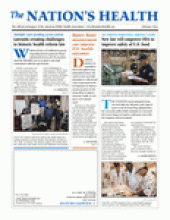While most people diagnosed with cancer are alive after five years, many of them continue to experience cancer-related pain, and the severity of pain varies by race and sex, according to a new study.
The study, published online in November in the journal Cancer, found that 20 percent of cancer survivors report having current cancer-related chronic pain at least two years after diagnosis. Moreover, more than 40 percent of patients surveyed have experienced pain since their initial diagnosis, and the pain was worse for blacks and women than for whites and men.
“All in all, the high prevalence of cancer and pain — and now chronic cancer pain among these survivors, especially blacks and women — shows there’s more work to be done in improving the quality of care and research,” lead study author Carmen Green, MD, professor of anesthesiology, obstetrics and gynecology at the University of Michigan, said in a January statement releasing the study results.
The study, conducted by researchers at the University of Michigan Health System, looked at cancer survivors who had been initially diagnosed at least two years earlier with either multiple myeloma, colorectal, breast, prostate or lung cancer.
“Cancer-related chronic pain remains a poorly explored survivorship issue, especially among diverse cancer survivors,” the study authors noted. “As America ages and diversifies the increasing prevalence of cancer, pain, and cancer-related chronic pain will have significant individual and societal ramifications.”
Among white participants, cancer surgery took the lead as the most significant source of pain, while blacks more frequently pointed to cancer treatment as their most significant source of cancer-related pain. Women reported more pain flares than men, as well as more disability due to pain, poorer cognitive functioning and more depression related to pain.
Blacks with pain reported higher pain severity, including greater pain-related disability, than whites. Moreover, blacks also expressed more concerns about the side effects of pain treatments and had poorer general health and physical and social functioning than whites.
According to the National Cancer Institute, more than 60 percent of people diagnosed with cancer will be alive in five years. But the study notes that between 60 percent and 85 percent of people with advanced cancer and nearly 40 percent of five-year survivors report pain, which is linked to many unscheduled hospital admissions and $10 million in health care costs annually.
“However, cancer-related chronic pain remains a poorly explored survivorship issue, especially among diverse cancer survivors,” the study authors write. “As America ages and diversifies the increasing prevalence of cancer, pain, and cancer-related chronic pain will have significant individual and societal ramifications.”
Patient and physician knowledge and attitudes may lead to poor pain management, according to the study. For instance, worries about side effects such as addiction or fears that pain is a sign that the cancer has gotten worse may lead patients and their doctors to minimize pain complaints.
To view or download the study, “Cancer-Related Chronic Pain: Examining Quality of Life in Diverse Cancer Survivors,” visit http://www.canceronlinejournal.com/view/0/index.html.
- Copyright The Nation’s Health, American Public Health Association









